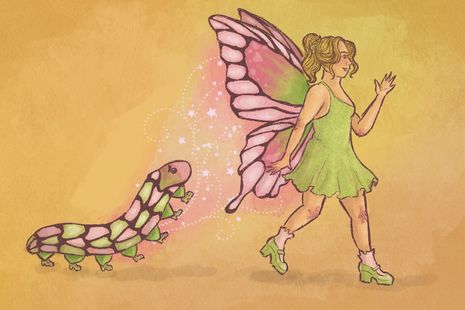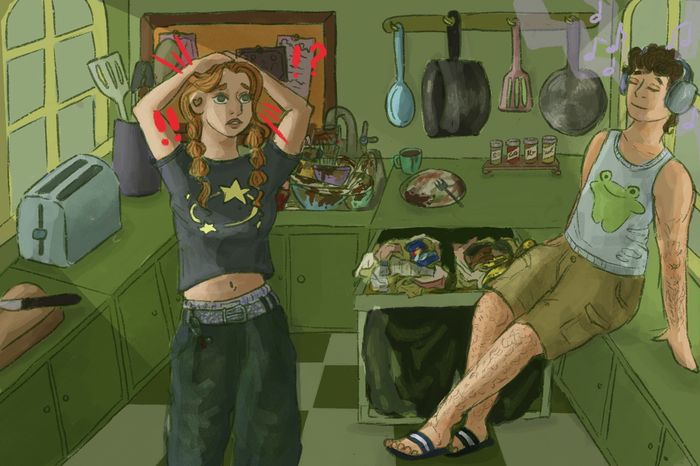It’s pretty fun to talk to strangers
Olivia Redman encourages us to escape our comfort zone and talk to strangers

A fun perk of writing for Varsity, apart from the immortal glory that comes with having your name attached to a real published article, is that there’s an annual VarSoc dinner held in the Old Hall at Queens’. If, like me, you’re someone who’s trying to go to a formal at every college, you’ll understand that Queens’ Old Hall is a kind of gastronomic white whale. Getting a ticket for a formal there seems harder than getting Oasis tickets (although it’s a lot less likely that Queens’ will disband in the next few months), so, when I found out about the VarSoc dinner, I was desperate to see it in person. The only problem was that the friend I’d planned to attend with had pulled out, and, on a FaceTime call to my family, I found myself dithering over whether I ought to go despite knowing a grand total of zero people there.
“Livvy,” my father said to me sagely, “it’s an important skill to be able to walk into a room full of strangers and just start talking to people.”
Of course, my dad was right – this is an important skill – but, crucially, I think it’s one most people don’t realise they already have.
We’ve all had the adage of don’t talk to strangers drilled into our heads as children, but talking to strangers isn’t really something you can avoid. Almost everyone, especially at Cambridge, will have had the experience of walking into a room and not knowing a single person there. Matriculation dinner, after all, effectively involves spending the evening talking to total strangers. Formal swaps work under a similar principle, especially if you’re aiming to go to one at any of the mature or postgrad colleges where it’s simply less likely that you’ll know anyone. More personally, a series of CamDram-related events during Lent meant that I ended up attending a formal at another college with a girl I’d only met twice before, and yet – despite the two of us being almost strangers – I ended up genuinely really enjoying myself.
“We’ve all had the adage of don’t talk to strangers drilled into our heads as children”
As it happens, I also had a fantastic time at the Varsity Society dinner. I texted a girl who also happened to be writing for Lifestyle this term, and we decided to go together. As it happens, we got on really well; more than one person, on asking how we’d met, was surprised to learn that we’d only properly met that day. Not long after, I arranged a formal swap with a girl at Downing, whom I’d previously only spoken to over text; despite not knowing whether or not we’d vibe as well as we had via Instagram DMs, I ended up thoroughly enjoying myself.
It’s natural for there to be an element of fear and uncertainty about meeting new people. Wanting to make a good first impression is normal. At the same time, though, I’ve come to realise that this fear and uncertainty is entirely unnecessary; there isn’t really anything to be afraid of. Of course, it’s very possible that you won’t immediately click with the random postgrad who you need to do a formal swap with in order to tick off all 31 colleges. It’s more than likely that the stranger whose makeup you randomly compliment in the bar doesn’t immediately feel like leaving their friends behind in the cloistered courts of college and skipping off into the sunset with you. It’s also crucial to remember that you’re never going to get over that immediate feeling of fear unless you actively practice engaging with new people. Nobody starts life as a social butterfly; there’s a caterpillar stage involved for all of us, if you’ll excuse the bug metaphor.
“Nobody starts life as a social butterfly; there’s a caterpillar stage involved for all of us, if you’ll excuse the bug metaphor”
Realistically, though, especially in the Cambridge bubble, the stakes associated with talking to someone you don’t know are very low. People at this university tend to be interesting and intelligent people with plenty to say, which, on the whole, makes it pretty likely you’ll have fun. Worst-case scenario, you make idle small talk with a stranger for a while, and leave your formal, or society social, or even your Varsity-organised blind date, with a newfound appreciation for discussing the weather. Best-case scenario, you click well with someone you didn’t know before, and leave with a new friend.
Even if orchestrating a formal swap with someone you don’t know beforehand feels daunting, there’s also something legitimately rewarding about simply putting small amounts of kindness into the universe and not expecting anything back. It might feel slightly embarrassing to tell someone random in the queue for Harvey’s that you really like their dress, but the boost that compliment will give is going to vastly outweigh however much you internally cringed whilst saying it.
In my opinion, however, you meet new people, the most important thing is making sure you’re going into every encounter with an optimistic attitude. In essence: you kind of need to expect that you’ll enjoy yourself, and like the people you meet. When I’d mentioned the formal swap I was doing at Downing to a friend, he’d seemed slightly bemused.
“What are you going to do if you don’t get along with her at the first formal?” he’d asked, “Won’t it make the second one kind of awkward?”
“I hadn’t considered it,” I’d told him, “I’m just assuming we’ll like each other.”
Now, this article isn’t trying to preach about manifestation or speaking things into the universe. But, I do think something as simple as expecting a positive outcome to whatever new situation you find yourself in can have a positive effect on your mindset going into that new situation. If you want to have a good time, I think you’re much more likely to have one, and if you want to have fun talking to strangers, I think you’re much more likely to be successful if you already believe you will.
 Comment / College rivalry should not become college snobbery30 January 2026
Comment / College rivalry should not become college snobbery30 January 2026 News / Downing Bar dodges college takeover31 January 2026
News / Downing Bar dodges college takeover31 January 2026 News / Cambridge for Palestine hosts sit-in at Sidgwick demanding divestment31 January 2026
News / Cambridge for Palestine hosts sit-in at Sidgwick demanding divestment31 January 2026 Science / Meet the Cambridge physicist who advocates for the humanities30 January 2026
Science / Meet the Cambridge physicist who advocates for the humanities30 January 2026 Lifestyle / Which Cambridge eatery are you?1 February 2026
Lifestyle / Which Cambridge eatery are you?1 February 2026









